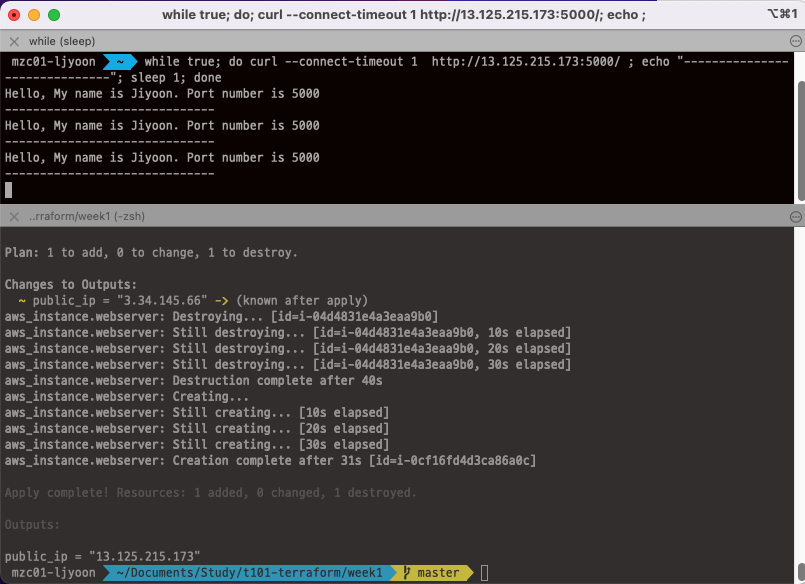Terraform Variable 이란
Terraform은 HCL(HashiCorp Configuration Language)라는 개별 언어를 사용하며, 변수를 정의하고 주입해서 사용할 수 있습니다.
변수는 용도에 따라 입력 변수, 출력 변수로 구분됩니다. 입력 변수는 인프라를 구성하는 값을 정의하는 데 사용되며 출력 변수는 배포 후 인프라에 대한 정보를 얻는 데 사용됩니다.
입력 변수
선언 방법
입력 변수의 선언 방법과 사용할 수 있는 인수들은 아래와 같습니다.
variable “NAME” { [CONFIG …] }
- description : 설명, 코드 내용 및 plan/apply 명령어를 실행할 때 출력됩니다.
- default : 변수 값을 전달하는 방법을 지정하지 않으면 기본값이 전달됨, 기본값이 없으면 대화식으로 사용자에게 변수에 대한 정보를 질의합니다.
- 변수 값 전달 : 명령 줄(-var 옵션), 파일(-var-file 옵션), 환경 변수(테라폼은 이름이 ‘TF_VAR_
’)
- 변수 값 전달 : 명령 줄(-var 옵션), 파일(-var-file 옵션), 환경 변수(테라폼은 이름이 ‘TF_VAR_
- type : 전달하려는 변수의 유형을 지정합니다. 유형을 지정하지 않으면 any로 지정됩니다. string number bool list map(key-value) set object tuple
- sensitive : 입력 변수가 사용될 때 출력 제한(암호 등 민감 데이터)
- validation : 변수 값에 사용자 지정 검사를 설정할 수 있습니다.
선언 예시
1
2
3
4
5
6
7
8
9
10
11
12
13
14
15
16
17
18
19
20
21
22
23
24
25
26
27
28
29
30
31
32
33
34
35
36
variable "string_example" {
description = "An example of a string variable in Terraform"
type = string
default = "example"
}
variable "list_example" {
description = "An example of a list in Terraform"
type = list
default = ["a", "b", "c"]
}
# 리스트 내 항목이 number인 list
variable "list_numeric_example" {
description = "An example of a numeric list in Terraform"
type = list(number)
default = [1, 2, 3]
}
# object로 구조적 유형(structural type) 정의 가능
variable "object_example" {
description = "An example of a structural type in Terraform"
type = object({
name = string
age = number
tags = list(string)
enabled = bool
})
default = {
name = "value1"
age = 42
tags = ["a", "b", "c"]
enabled = true
}
}
입력 방법
변수 정의
1 2 3 4
variable "webserver_port" { description = "The port the server will use for HTTP requests" type = number }
입력 방법
1 2 3 4 5 6 7 8 9 10 11 12 13 14 15 16 17 18 19
# 대화형 방식으로 입력 terraform plan var.webserver_port The port the server will use for HTTP requests Enter a value: # terraform 명령어에 -var 옵션으로 입력 terraform plan -var "webserver_port=8080" # 환경변수를 통해 입력 export TF_VAR_webserver_port=8080 && terraform plan # Default 값을 통해 입력 variable "webserver_port" { description = "The port the server will use for HTTP requests" type = number default = 8080 }
사용 방법
var.
1 2 3 4 5 6 7 8 9 10
resource "aws_security_group" "instance" { name = "terraform-example-instance" ingress { from_port = var.server_port to_port = var.server_port protocol = "tcp" cidr_blocks = ["0.0.0.0/0"] } }
${var.
} 1 2 3 4 5
user_data = <<-EOF #!/bin/bash echo "Hello, World" > index.html nohup busybox httpd -f -p ${var.server_port} & EOF
유저 데이터와 같이 문자열 내에서 참조가 필요한 경우 사용합니다.
출력 변수
출력 변수를 사용하면 배포 후 확인이 필요한 정보들을 쉽게 체크할 수 있습니다.
선언 방법
출력 변수의 선언 방법과 사용할 수 있는 인수들은 아래와 같습니다.
output “NAME” { [CONFIG …] }
- NAME은 출력 변수의 이름이며, VALUE는 출력하려는 테라폼 표현식입니다.
- description : 출력 변수에 어떤 유형의 데이터가 포함되어있는지 출력됩니다.
- sensitive : 출력 변수 값이 암호 등 민감 데이터인 경우 출력을 제한합니다.
- depends-on : 출력 변수에 의존성이 존재하는 경우 사용하면 처리 순서를 보장할 수 있습니다.
선언 예시
1
2
3
4
output "public_ip" {
value = aws_instance.example.public_ip
description = "The public IP address of the web server"
}
사용 방법
1
2
3
4
5
6
7
8
9
10
11
12
13
14
15
16
17
terraform apply
...
aws_instance.webserver: Creation complete after 21s [id=i-0e57686cd032fc0db]
Apply complete! Resources: 2 added, 0 changed, 0 destroyed.
Outputs:
public_ip = "13.125.215.173"
# 명령어를 통한 확인 방법
terraform output
...
public_ip = "13.125.215.173"
...
terraform output public_ip
"13.125.215.173"
포트 넘버를 입력받아 웹 서버 생성하기
코드 파일 작성 및 배포
1 2 3 4 5 6 7 8 9 10 11 12 13 14 15 16 17 18 19 20 21 22 23 24 25 26 27 28 29 30 31 32 33 34 35 36 37 38 39 40 41 42 43 44 45 46 47
# main.tf data "aws_ssm_parameter" "amzn2_latest" { name = "/aws/service/ami-amazon-linux-latest/amzn2-ami-hvm-x86_64-gp2" } resource "aws_instance" "webserver" { ami = data.aws_ssm_parameter.amzn2_latest.value instance_type = "t2.micro" vpc_security_group_ids = [aws_security_group.webserver.id] user_data = <<-EOF #!/bin/bash yum update -y && yum install httpd -y sudo sed -i "s/Listen 80/Listen ${var.webserver_port}/g" /etc/httpd/conf/httpd.conf echo "Hello, My name is Jiyoon. Port number is ${var.webserver_port}" > /var/www/html/index.html systemctl restart httpd EOF user_data_replace_on_change = true tags = { Name = "webserver1" } } resource "aws_security_group" "webserver" { name = var.security_group_name ingress { from_port = 22 to_port = 22 protocol = "tcp" cidr_blocks = ["0.0.0.0/0"] } ingress { from_port = var.webserver_port to_port = var.webserver_port protocol = "tcp" cidr_blocks = ["0.0.0.0/0"] } egress { from_port = 0 to_port = 0 protocol = "-1" cidr_blocks = ["0.0.0.0/0"] } }
1 2 3 4 5 6 7 8 9 10 11 12 13 14 15 16 17 18 19 20 21 22 23 24
# provider.tf provider "aws" { region = "ap-northeast-2" profile = "ljyoon" } # variable.tf variable "security_group_name" { description = "The security group name of webserver" type = string default = "webserver" } variable "webserver_port" { description = "The port the server will use for HTTP requests" type = number default = 5000 } # output.tf output "public_ip" { value = aws_instance.webserver.public_ip description = "The public IP of the Instance" }
실행 결과
리소스 삭제
1
terrafrom destroy && terraform init
참고
- 출력 변수
- 가시다님 스터디 자료
